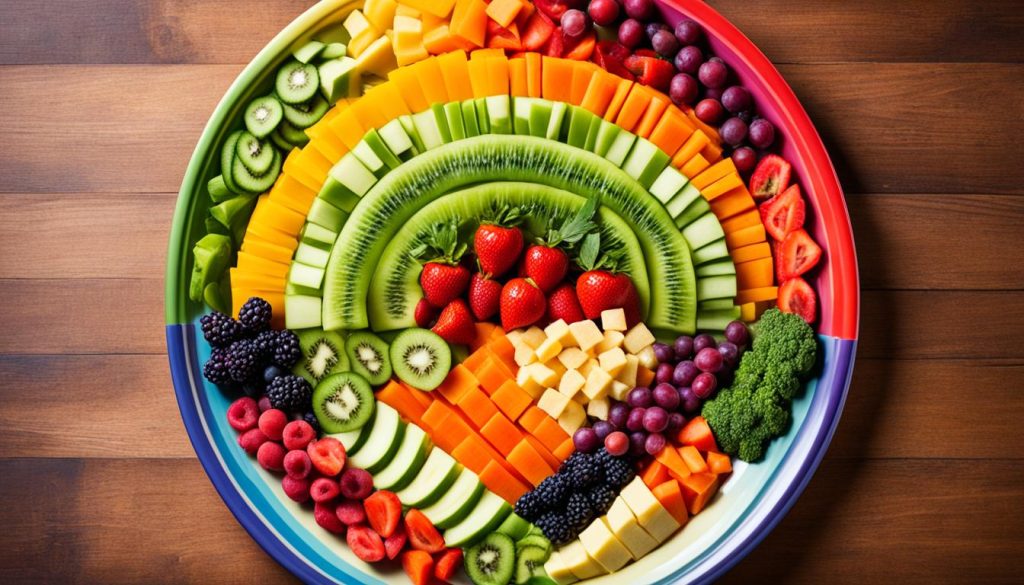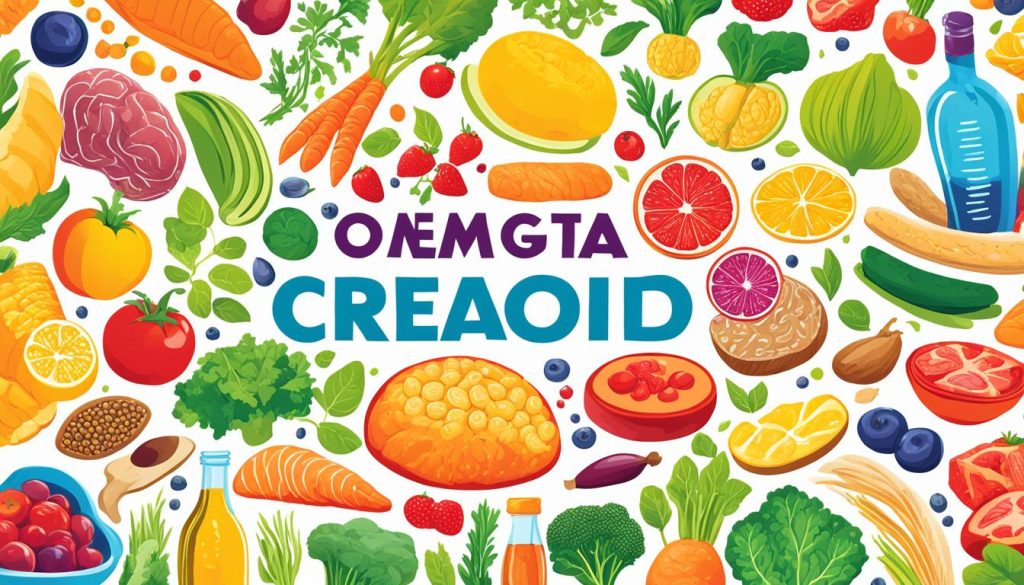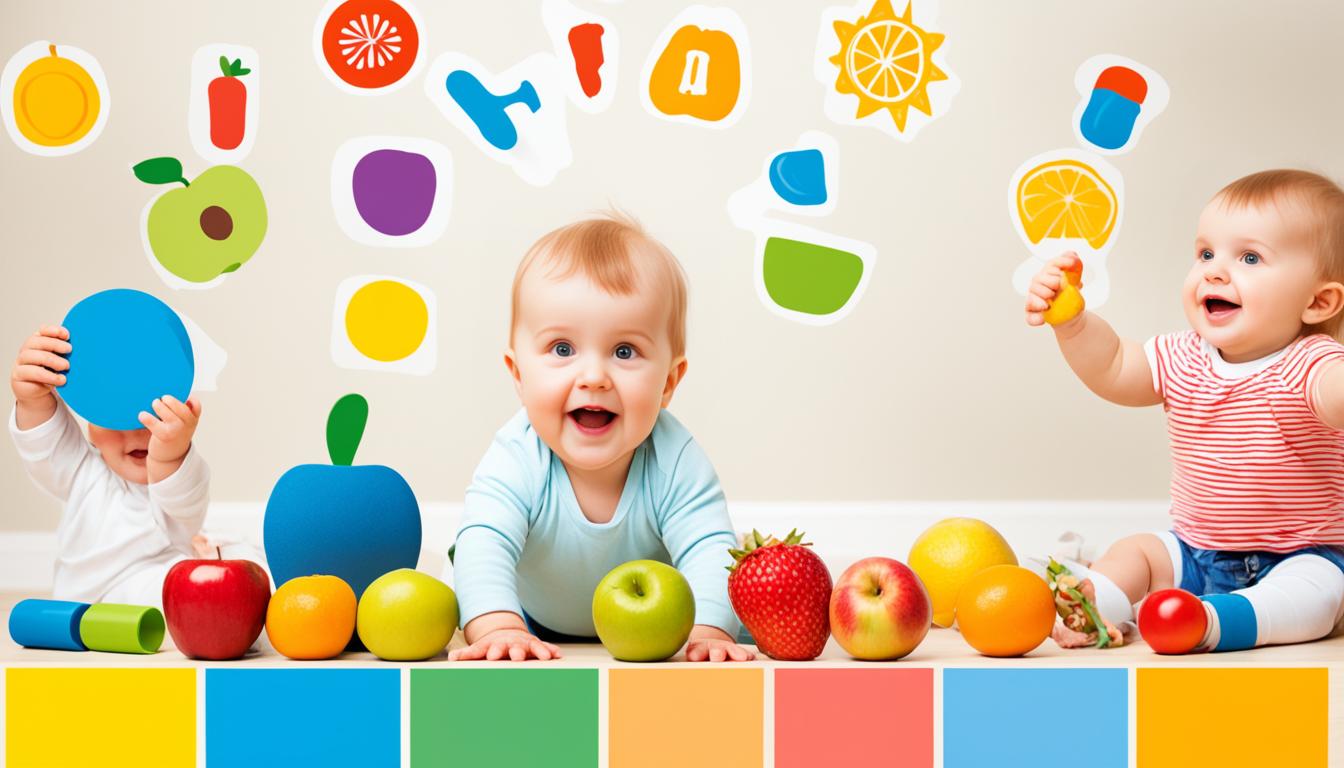Have you ever seen a child take their first steps or heard their first words? These moments are key to child development and shape their future. As parents and educators, we aim to give our children the best support for their growth. But, we often overlook the crucial role of nutrition in this journey.
Nutrition is key to not just physical growth but also to a child’s brain development and emotional well-being. It’s like building a strong foundation for their future.
Think of a child’s brain as a complex network that’s forming connections fast in the early years. These connections are crucial for learning and growing. The World Health Organization says that not getting enough nutrients can slow down development and hurt brain power. By feeding your child right, you’re helping them learn and grow, which boosts their self-confidence.
The first 1000 days are super important for nutrition and growth. Missing out on key nutrients during this time can harm them forever. Research shows that not eating well can make kids less smart and less social. So, knowing how nutrition affects your child’s growth is key. By choosing healthy foods for them, you’re setting them up for a bright future.
Key Takeaways
- The first 1000 days are crucial for child nutrition and development.
- Proper nutrition impacts cognitive function and emotional intelligence in children.
- Malnutrition can lead to developmental delays and intellectual deficits.
- A nutrient-rich diet is essential for building self-esteem in children.
- Investing in proper nutrition is investing in children’s future potential.
The Importance of a Nutrient-Rich Diet for Children
Feeding kids a diet full of nutrients is key for their health and brain growth. Foods packed with vitamins and minerals help kids grow strong and healthy. This is backed by the World Health Organization.
In the U.S., many kids eat too much processed food and sugar. This is a big worry since 75% of packaged foods have added sugar. For instance, a 12-ounce soda can have up to 10 teaspoons of sugar.
This is way more than what kids should have, as advised by the American Academy of Pediatrics. Too much sugar can lead to health problems like depression, anxiety, and obesity.

Teaching kids about healthy eating is vital. Full-fat dairy is good for kids under 2 because they need lots of energy. Foods like lean meats, eggs, and fish are great for muscle growth.
Adding fruits, vegetables, and legumes to meals and snacks is important. It makes sure kids get all the nutrients they need. A balanced diet also helps with social skills, making kids more focused and well-behaved.
Water is the best drink for kids over 12 months, with fluoride to protect teeth. Until they are about 12 months old, breastmilk or formula should be their main drink. Cutting down on fast food and sugary snacks can lower health risks.
To be a good parent, offer healthy snacks like fruits, veggies, and yogurt. This encourages a balanced diet.
Critical Nutrients for Brain Development
Getting the right nutrients early on is key for your child’s brain health and growth. Early childhood is a time of fast brain development. It needs a mix of important nutrients to work well. These nutrients help with thinking skills and shape how kids learn and behave.

Role of Iron in Cognitive Function
Iron is vital for thinking skills. It helps with brain functions and making brain connections. Babies over six months need more iron than what breast milk alone provides. Foods like fortified cereals and leafy greens are good sources.
Not getting enough iron in the first two years can lower IQ and cause behavior issues. This can affect how well kids learn and think.
Essential Fatty Acids and Brain Health
Omega-3 fatty acids are key for brain health. They help with brain cell growth and thinking skills like memory. Foods like fish, flaxseeds, and walnuts are good sources.
Getting enough of these nutrients helps kids learn better. It supports how they learn and think.
Choline and Its Impact on Memory
Choline is crucial for brain and memory development. It helps brain cells work better, which is important for memory and learning. You can find choline in meat, fish, eggs, and beans.
Enough choline can boost memory and learning. It helps kids develop a growth mindset and take responsibility.
Other nutrients like zinc, iodine, and vitamins A and D are also key for brain development. Paying attention to these can help kids learn, grow, and become more responsible.
Nutrition Deficiencies and Developmental Delays
Nutrition plays a big role in a child’s growth. It’s important to spot and fix nutrition issues early to help your child grow well. Look out for signs that show your child might not be getting enough nutrients.
Symptoms of Nutritional Deficiencies
Signs of not getting enough nutrients can be different. They might include being too thin or too heavy, constipation, feeling very tired, cavities, and not growing well. Not getting enough food can hurt how well a child thinks and learns (Bryan et al., 2004). Using Effective Discipline Strategies can help make eating healthy a habit. Catching these signs early can prevent serious delays in growth and development.

Long-Term Effects of Malnutrition
Not getting enough nutrients can have big effects over time. Kids who don’t get enough food might not develop their minds well and could do worse in school. Studies show that not having enough nutrients can hurt brain growth (Parada et al., 2008). Not eating well during important growth times can make it harder to think well and be creative. Eating right helps manage tantrums and supports thinking skills.
Also, not having enough money can make it harder to get the right food and can slow down growth (Bradley and Corwyn, 2002). Fixing these issues means looking at diet and social support to help your child grow and stay healthy.
Positive Parenting and Nutritional Choices
Positive parenting is key in shaping a child’s eating habits and tastes. When kids help with meal planning and cooking, they learn to value healthy eating. Studies show that kids eat better when parents use positive parenting methods.

By setting boundaries with kids on food choices and explaining why healthy meals are important, parents help build good habits. This kind of parent-child communication improves eating habits and makes the parent-child bond stronger.
Research finds that positive parenting leads to better school performance and fewer behavior issues in kids by sixth grade (Pettit, Bates & Dodge, 1997). Supportive and engaging parenting helps kids become emotionally strong and healthier.
| Positive Parenting Outcomes | Impact on Child Development |
|---|---|
| Nurturing Secure Attachments | Enhanced emotional resilience, reduced behavioral problems |
| Structured Meal Times | Better dietary habits, heightened appreciation for nutritious foods |
| Involving Children in Cooking | Promotion of healthy lifestyle and eating behaviors, strengthened parent-child connections |
| Open Communication | Improved emotional bonding, reduced health disparities |
The authoritative parenting style, which balances support with clear rules, works well for these benefits. Cooking together not only encourages healthy eating but also strengthens family bonds through meaningful talks.
These efforts show how positive parenting can be a part of everyday life. It helps create healthier and more resilient kids for the future.
The Role of Vitamins and Minerals in Physical Growth
Vitamins and minerals are key for kids’ physical growth. Iron, zinc, iodine, and folate help with organ growth, bone development, and keeping the immune system strong. In places like Adelaide, Hobart, or Melbourne during winter, kids might not get enough vitamin D. This can affect their growth.
Getting enough of these nutrients is important for Child Development Milestones. Many kids lack iron because of diet, health issues, or heavy periods. It’s important to meet the Recommended Dietary Allowance (RDA) for vitamins and minerals.
- 400 μg of Vitamin A
- 25 mg of Vitamin C
- 1,000 mg of Calcium
- 10 mg of Iron
For kids aged 9 to 13, the needs are:
- 600 μg of Vitamin A
- 15 μg (600 IU) of Vitamin D
- 1,300 mg of Calcium
- 8 mg of Zinc
- 12 mg of Niacin
- 240 mg of Magnesium
Getting the right amount of vitamins and minerals helps kids develop healthy habits and reach their growth milestones. But, it’s important not to take too much, as some can be harmful in large doses.
Kids on vegan or vegetarian diets might not get enough iron and zinc. They might need supplements or special foods. Talking to dietitians or doctors can help kids stay healthy and know what they need to eat. Kids with conditions like coeliac disease need special diets to avoid health problems and grow well.
| Age Group | Vitamin A (μg/day) | Vitamin C (mg/day) | Calcium (mg/day) | Iron (mg/day) |
|---|---|---|---|---|
| 4-8 years | 400 | 25 | 1,000 | 10 |
| 9-13 years | 600 | – | 1,300 | 8 |
The Effect of Early Nutrition on Lifelong Health
Early nutrition is key to lifelong health. It affects chronic disease risk, school performance, and life quality. Getting the right nutrients in the first 1,000 days is crucial for brain growth and thinking skills. By following Lifelong Learning in Children, parents can make sure their kids have a healthy start.
The World Health Organization says good feeding habits in babies and young kids are vital for health later on. Studies show that giving kids veggies early makes them like veggies more. This is a great way to teach kids to appreciate healthy foods they like.
Having a routine at mealtime and feeding kids when they’re hungry helps kids eat better. These habits teach kids good eating habits and support Family Respect and Empathy at the dinner table. Parents should make mealtime positive to help kids learn these values.
Feeding kids well with lots of veggies, fruits, whole grains, and lean meats can prevent obesity and chronic diseases. Research by Rose et al. (2017) shows that what kids eat as babies affects their eating habits and weight at age six. This approach teaches kids to love healthy living, including Benefits of Outdoor Play and being active.
Feeding kids when they’re hungry is a good way to teach them healthy eating. Don’t force or bribe them to eat, as that can backfire. Teaching adults to help kids know when they’re hungry or full helps kids eat mindfully. This is good for their health.
| Early Nutrition Factors | Associated Benefits |
|---|---|
| Overall nutrient intake during first 1,000 days | Optimal brain development and cognitive abilities |
| Early exposure to vegetables | Increased acceptance and enjoyment of healthy foods |
| Mealtime structure & responsive feeding | Reduced food fussiness, improved food enjoyment |
| Diet rich in whole foods | Prevention of obesity, reduced chronic disease risk |
| Promoting physical activity | Enhanced physical health, lifelong fitness habits |
Parenting and Raising Kids: Nutrition Strategies
Parents are key in teaching their kids good eating habits. In today’s world, it’s important to focus on nutrition despite the rise of technology and screens.
Incorporating Vegetables and Fruits
The Dietary Guidelines suggest that half of kids’ plates should be filled with fruits and veggies. This helps ensure they get the nutrients they need and prevents shortages. Parents should try to give their kids at least five servings of fruits and veggies each day.
Using fun and colorful ways to present these foods can make them more appealing. Many kids are hesitant to try new foods, but creative presentation can help.
Using Balanced Meals to Set Healthy Habits
Offering balanced meals is crucial for kids’ growth and health. Meals should include whole grains, lean proteins, and dairy to promote healthy eating habits. Eating foods rich in nutrients like potassium, calcium, vitamin D, and fiber is important for everyone’s health.
Managing screen time well can make mealtime more focused. This lets families enjoy nutritious meals without digital distractions. Regular family meals are good for nutrition and help kids develop social skills and behave better.
These strategies help in raising kind kids. Sharing meals strengthens family bonds and encourages talking. Letting kids help with meal prep can make them more positive about healthy eating and set good habits for life.
Tackling Nutrition Challenges in Adolescents
Adolescence brings many nutritional challenges. As teens become more independent, they make food choices based on friends and media. This often leads to poor eating habits. Parents must manage these issues to ensure their kids eat well.
In Africa, 12 girls out of 100,000 face protein-energy malnutrition. In the Eastern Mediterranean, it’s 3 girls per 100,000. In rural India, 39 percent of students are too thin, and 59 percent are stunted. These numbers show the need for better nutrition education and mental health support for teens.
Talking to teens about food’s nutritional value helps build their resilience. It’s a key step in teaching them about healthy eating.
A study in urban Brazil found 24 percent of teens were overweight. Also, 36 percent of families faced mild food insecurity, and 24 percent faced severe food issues.
Feeding teens a balanced diet is crucial. Girls aged 14 to 18 need 1,800 to 2,400 calories a day. Boys in this age group need 2,000 to 3,200 calories. Active teens might need up to 5,000 calories daily. In India, half of teens didn’t get 70 percent of their daily energy needs, showing a big gap in nutrition.
To tackle these issues, we need a comprehensive approach. Parents should talk about the health effects of certain diets. They should watch out for iron and calcium deficiencies, important for teens. A supportive environment helps teens make better food choices and stay healthy.
| Region/Country | Condition | Prevalence among Adolescents |
|---|---|---|
| Africa | Protein-energy malnutrition | 12 girls per 100,000 |
| Eastern Mediterranean | Protein-energy malnutrition | 3 girls per 100,000 |
| Rural India | Thinness | 39 percent |
| Rural India | Stunting | 59 percent |
| Urban Brazil | Overweight | 24 percent |
| Urban Brazil | Mild Food Insecurity | 36 percent |
| Urban Brazil | Moderate to Severe Food Insecurity | 24 percent |
Conclusion
This article showed how important nutrition is for kids’ growth and health. We talked about how a balanced diet affects their physical and mental growth. We looked at studies and what parents say to understand the role of vitamins, minerals, and nutrients like iron and essential fatty acids.
Parents play a big part in teaching kids about food choices. They have to balance work and family life while doing this. Family traditions help kids develop good eating habits. Also, both moms and dads should be involved in parenting to help kids feel secure and mentally healthy.
Good parenting means giving kids healthy food and supporting their education. It also means building a strong emotional bond with them. This approach helps kids become well-rounded and healthy. By focusing on these things, we help our kids grow up healthy and set them up for success.
FAQ
How does nutrition impact child development?
What are the key nutrients essential for brain development?
How can parents ensure their children are receiving adequate nutrients?
What are the symptoms of nutritional deficiencies in children?
How does early nutrition affect lifelong health?
What are the long-term effects of malnutrition in children?
How can positive parenting influence children’s dietary habits?
What strategies can help build healthy eating habits in children?
What nutritional challenges do adolescents face?
What is the role of vitamins and minerals in a child’s development?
This post contains affiliate links. If you click on a link and make a purchase, I may earn a small commission — at no extra cost to you. Thank you for supporting this blog and helping me keep the patterns free! Read the full Affiliate Disclosure & Transparency.
